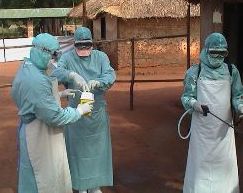Disease outbreaks
 Outbreaks are urgent emergencies accompanied by rapid efforts to save lives and prevent further cases. Photo credit: WHOA disease outbreak is the occurrence of cases of disease in excess of what would normally be expected in a defined community, geographical area or season. Outbreaks are maintained by infectious agents that spread directly from person to person, from exposure to an animal reservoir or other environmental source, or via an insect or animal vector. Human behaviours nearly always contribute to such spread. Early detection and reporting of such events is crucial in minimizing their negative social and economic impact.
Outbreaks are urgent emergencies accompanied by rapid efforts to save lives and prevent further cases. Photo credit: WHOA disease outbreak is the occurrence of cases of disease in excess of what would normally be expected in a defined community, geographical area or season. Outbreaks are maintained by infectious agents that spread directly from person to person, from exposure to an animal reservoir or other environmental source, or via an insect or animal vector. Human behaviours nearly always contribute to such spread. Early detection and reporting of such events is crucial in minimizing their negative social and economic impact.
Epidemic-prone diseases, including emerging and re-emerging diseases constitute the greatest threat to public health security and the disruption of social and economic developments of the countries of the Eastern Mediterranean Region.
In the past 20 years, the Region has witnessed a marked increase in the number of outbreaks and pandemics caused by emerging and re-emerging diseases, such as Alkhurma haemorrhagic fever, chikungunya, cholera, dengue, A/H5N1 influenza, pandemic A/H1N1 (2009) and Rift Valley fever, among others. This situation has been exacerbated by acute and chronic humanitarian crisis in many countries of the Region.
Information resources
Related topics
International Health Regulations (IHR)
Related programmes
International Health Regulations (IHR)
Surveillance, forecasting and response


